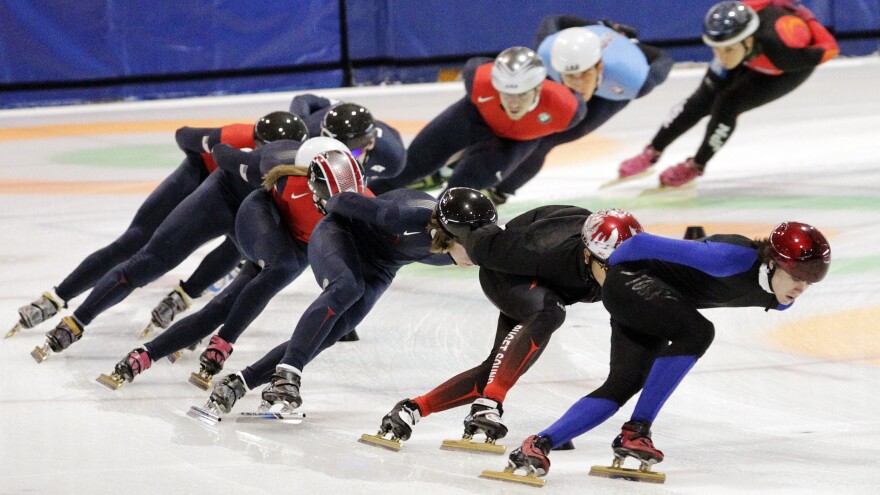Rebellious athletes, drained budgets, dysfunctional management and a string of embarrassing scandals forced a major reorganization of U.S. Speedskating over the weekend.
The group governs a sport that has produced 85 Winter Olympic medals for the United States — more than any other sport. But persistent turmoil threatened continued success in the next Games, just nine months away in Sochi, Russia.
The changes leave USS with a smaller board and without numerous committees that have permitted parochial interests to meddle in the governance of the sport.
"You have to have a board [with an] oversight mentality [that] allows the staff to do all the planning and execution," says Mike Plant, a former Olympic speedskater who is now vice president of the Atlanta Braves. Plant was tapped by the U.S. Olympic Committee in March to try to fix U.S. Speedskating's problems.
"When you have a system where the staff ... has multiple people telling it how to operate [and] how to plan ... it can't be efficient and it can't be effective," Plant adds. "It led to a lot of dysfunction."
With USOC backing, Plant won board approval for dispensing with existing committees and adding independent directors. He told board members that possible decertification by the USOC would be tantamount to bankruptcy.
USS was already $750,000 dollars in debt last year, Plant told NPR, but he expects the budget to be in the black by the end of 2013.
"There really wasn't any meddling going on until the [USS] office wasn't doing the job anymore," says Fred Benjamin, a Chicago lawyer who lost a key committee role in the shuffle. "No one would make a decision, and stuff got out of hand."
That "stuff" included athletes left without promised stipends, confusion in selecting skaters for the national team and coaches accused of physically and verbally abusing skaters.
More than a dozen skaters filed formal grievances and complaints last year, which led to the disclosure that one athlete sabotaged the skate blade of a Canadian competitor at an international meet in Poland.
A USS investigation was inconclusive, saying testimony in an adversarial proceeding under oath would be best for deciphering the truth. The investigators also reported that they found no evidence of a "pattern" of physical and verbal abuse by coaches.
Plant did not address that unresolved scandal, deferring to a hearing next month in Germany set by the International Skating Union.
The athlete grievances also were not addressed this weekend. On Monday, a USOC panel rejected a USS motion to dismiss complaints filed by seven skaters and parents who claimed the group's funding and organizational problems effectively threatened athletes' ability to compete.
"We want no abuse," says Kori Novak, a spokeswoman for the athletes. "We want cooperation. We want transparency."
Novak is disappointed that the issues raised by complaining skaters were not addressed by Plant. "We're happy to see the USOC attempting to make some change with U.S. Speedskating," she says. But, "we're holding our breath waiting to see what will happen."
Novak and others are also concerned that the weekend gathering did not act on another scandal in the sport. Olympian and former USS CEO Andy Gabel stands accused of sexual misconduct. Two women came forward recently to say Gabel abused them in the 1990s when they were minors and Gabel's teammates. Gabel was an adult at the time.
In a statement to the Chicago Tribune, Gabel admitted he made "personal mistakes" but said that "I never forced myself on any individual and any allegations of that nature are absolutely false."
A USS committee met this weekend to consider ejecting Gabel from the U.S. Speedskating Hall of Fame but a decision was tabled pending a report by a law firm investigating the allegations for USS.
That's "very disappointing," says Rob Plum, a veteran skater and vice president of the Leading Edge Speedskating Club in Rockville, Md. "Gabel has publically admitted to inappropriate behavior."
With these scandalous loose ends remaining, USS has major challenges ahead. There are also deep rifts among the short track athletes, with some defending and continuing to train unofficially with former coach Jae Su Chun.
Plant isn't troubled by the fact that skaters are now split among at least three coaches.
"Look at figure skating, track and field, swimming and other models of success," Plant says. "Not everyone who is on those Olympic teams trains with the same coaches."
Whatever happens in the office, it's clear that change is coming on the ice for the short track team. Apolo Ohno, the most decorated American winter Olympic athlete ever, formally announced last month that he will not skate in Sochi. And Katherine Reutter, a star with two Olympic medals, said in February that persistent injuries forced her to retire at age 24.
Still, three-time Olympian Allison Baver is optimistic about competing in Sochi. She was one of the athletes who originally filed complaints against USS.
"It's been great to see the organization making great strides in this big year," Baver says. "We are already a stronger organization, and I have no doubt that we will produce more medals as a result."
Copyright 2021 NPR. To see more, visit https://www.npr.org.









